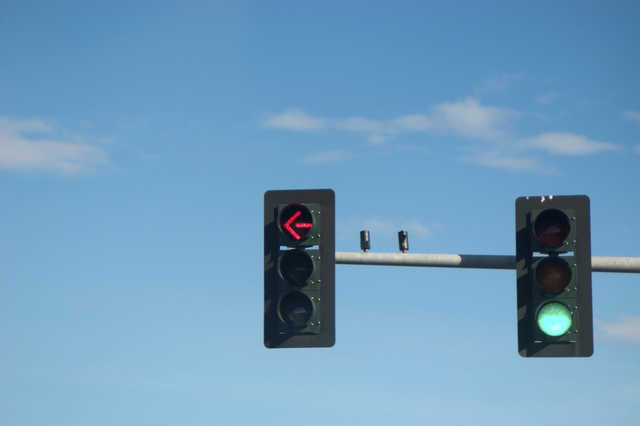Turning left on Blue Diamond? It’s all about timing and the timing’s been fixed

Those screams you’ve been hearing lately from the southwest valley are coming from motorists who want more time to make left turns at traffic signals on Blue Diamond Road.
You know the ones I’m talking about. These are not the new-version, flashing-yellow-arrow lights, which I refer to as “smart lights.” They’re the old-school left-turn signals in which you can turn only on a green arrow, and the rest of the time you’re stopped with a red arrow, which I refer to as “stupid lights.”
Warrior reader Jay was one of several who chimed in on Blue Diamond signal problems:
“Someone recently changed the timing of the light at Blue Diamond and Rainbow Boulevard. The left-turn signal on southbound Rainbow, turning east, used to last for at least 45 seconds. Now, that signal is only about 15 seconds long and traffic backs up considerably, especially during rush hour. Recently, I sat through five lights waiting to turn left onto Blue Diamond.
“Can you find out why this timing was changed and see if they can change it back? There was never an issue with traffic flow in any direction with that intersection. Why would they change something that wasn’t broken?”
C’mon, Jay, you know agencies change things that aren’t broken all the time — to try to make them better, you know.
In this case, it sounds like it could be a glitch, but it’s being looked at.
Brian Hoeft runs the Regional Transportation Commission of Southern Nevada’s Freeway and Arterial System of Transportation signal synchronization complex.
“There haven’t been any recent adjustments at the intersection, but after receiving your reader’s concern, our technicians were able to change the signal to increase the timing for the left turn from southbound Rainbow to eastbound Blue Diamond,” Hoeft said.
“FAST technicians will continue to monitor the intersection, as well as the entire corridor from Durango (Drive) to Las Vegas Boulevard throughout the week to ensure traffic is flowing smoothly.”
Hopefully, that fixes things. But I can’t help believing that this isn’t the last we’ve heard about smart lights, stupid lights and signal synchronization.
FREEWAY EXTENSION
Warrior reader John has observed an armada of road-grading equipment and is wondering what’s up:
“What’s going on with the northern 215 Beltway at Aliante Parkway? There is a lot of equipment moving dirt along the highway.”
You need a lot of graders, bulldozers and earthmovers when you build a freeway up to specs. And that’s what’s going on there.
After a long wait, ground was broken in the fall to improve the highway and flood-control infrastructure up to full freeway standards.
Once completed about a year from now, the 215 Beltway will be fully improved from the Decatur Boulevard to the North Fifth Street interchange.
Tack that on to the fully improved freeway from U.S. Highway 95 to Decatur, and you’ll have 7½ miles of completed highway when it’s done.
All that will be left for the Beltway is the stretch between Fifth Street and Interstate 15, the section between Cheyenne Avenue and U.S. 95 and two major interchange projects, the one with I-15 and the one with U.S. 95, the latter of which is already underway.
LOGANDALE DELAYS
Remember the Interstate 15 improvement project north of town?
Yes, it’s still ongoing and won’t be wrapped up until May. It was initiated in January 2014 as a surface improvement program with the added benefit of a new climbing lane at a steep portion of the highway at the Logandale exit.
Things got messier just north of the exit when a flash flood wiped out portions of both sides of the highway in September.
This week, there will be some additional work and potential delays that will result from the closure of one southbound lane between mileposts 93 and 95 as well as the southbound ramps at the exit.
The Glendale exit is suggested as a detour. The lane is expected to reopen at 4 p.m. Thursday.
SINKING SAND
When Edward Mote wrote the lyrics to the hymn “My Hope Is Built on Nothing Less,” he never contemplated a Road Warrior reference to “all other ground is sinking sand.” Ha, he probably never even contemplated cars, since he died in 1874.
Nonetheless, the Nevada Transportation Department is dealing with sinking sand or, more accurately, deteriorating soil conditions on Cheyenne Avenue between Commerce and Revere streets. The 350-foot section of roadway has 2-foot depressions in some places.
The department is spending $330,000 in emergency funds to pump 40,000 pounds of a structural polymer resin called Uretek into small drilled holes up to 20 feet deep in 750 locations.
Rancho Cucamonga, Calif.-based Eagle Lift is doing the work, which will result in nightly lane closures beginning at 8 p.m. on westbound Cheyenne Monday through Feb. 27.
The project has been described as a surgical solution guaranteed to last at least 10 years. The alternative would have been to dig down 20 feet with an excavator, remove the bad soil, replace it, grade the road and repave it.
My hope is built on this innovative surgery on Cheyenne.
NEW TRAFFIC LIGHT
The city of Las Vegas activated a new traffic signal Thursday at Alexander Road and Torrey Pines Drive, the latest in a series of nine new signals going live in the northwest valley.
It’s all part of $2.6 million project paid for with fuel revenue indexing funds.
When the city activates a new light, it usually turns it on in flashing-red mode so route commuters become aware of it with a forced stop.
Shortly thereafter, it goes into its standard cycle, which is what was scheduled to happen there.
Questions and comments should be sent to roadwarrior@reviewjournal.com. Please include your phone number. Follow @RJroadwarrior on Twitter.